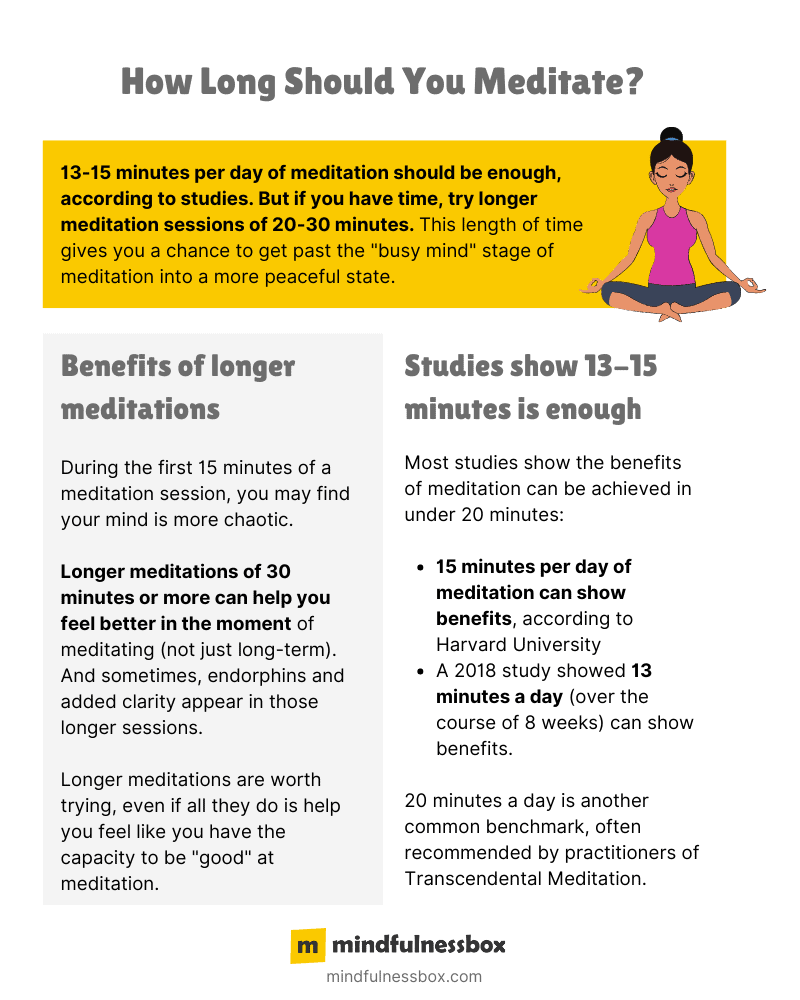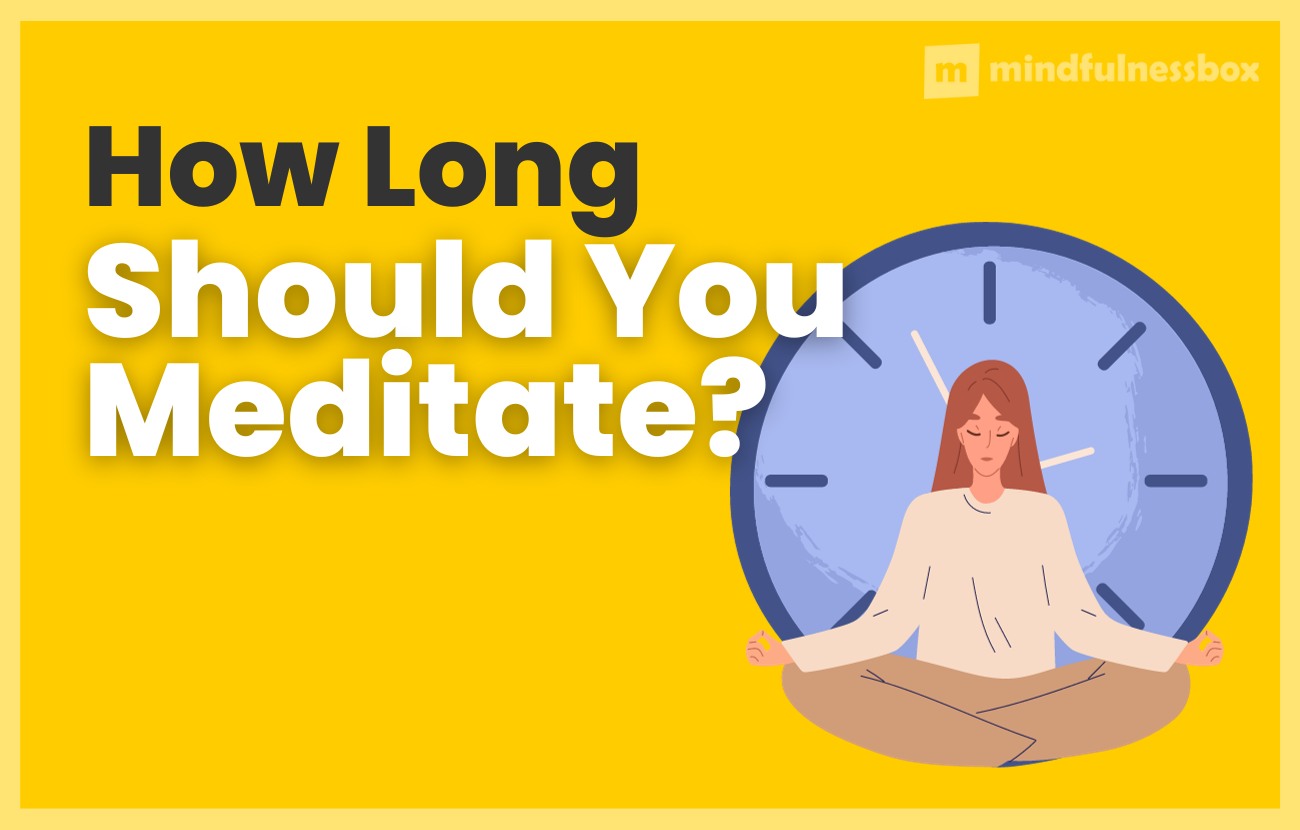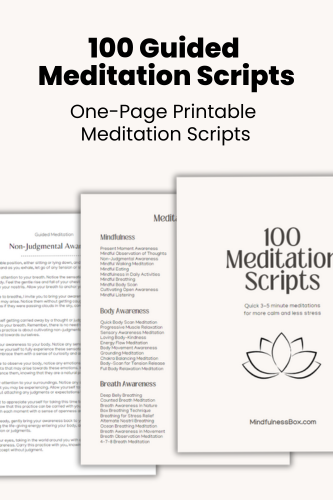How long should you meditate? The short answer: meditate for any amount of time that’s sustainable for you. If you have time, try and meditate for 20-30 minutes. This length of time gives you a chance to get past the “busy mind” stage of meditation, and settle into a more peaceful rhythm that leaves you feeling calmer for the rest of the day.
I’ve written a few articles about how meditation takes time to have an impact on your life, and that it’s not meant to feel good.
These 100 meditation scripts were created to help beginner and intermediate meditators practice key mindfulness concepts like self-love, forgiveness, gratitude, and inner peace.
Designed to fit into busy schedules, each meditation script lasts 3-5 minutes. Perfect for starting or closing a group meditation; for yoga, coaching, or therapy sessions; or for your personal meditation practice.
But here, I’m going to take a different approach.
I’m going to talk about how meditation can sometimes feel good in the moment, and how that might help you have a better day.
And this ties into the question of how long you should meditate.
How long should I meditate each day?

A good place to start is to shoot for 13-15 minutes per day over the course of 8 weeks. This puts you in line with many of the studies that have shown the benefits of meditation.
For example:
- 15 minutes per day of meditation can show benefits, according to Harvard University.
- That’s closely in line with a 2018 study that showed 13 minutes a day (over the course of 8 weeks) can show benefits.
- 20 minutes a day is another common benchmark, often recommended by practitioners of Transcendental Meditation.
- Then there’s the 45 minutes a day laid out in the Mindfulness-Based Stress Reduction program.
If you’re just getting started with mindfulness, you’re more likely to create a sustainable practice if you shoot for small wins at the beginning.
The most important benefits of meditation are all about how it has the potential to rewire your brain long-term. And these benefits can be achieved in as little as 10-20 minutes daily. Your commitment to yourself can be as short as a one-minute “mindful moment.” Five minutes is a common starting point for beginners using popular meditation apps.
If you want to experience immediate benefits from meditation, however, you should try and meditate for 30 minutes.
Here’s why.
Why longer meditations make sense
There are two key benefits to longer meditations: they have a way of letting your mind settle, and they can lead to breakthroughs that give you new insight into the clarity meditation can bring you.
1. Longer meditation sessions let your mind settle like sediment in a glass of water

The “muddy glass of water” is a common metaphor in the mindfulness world. It describes the “settling in” phase, at the beginning of your meditation.
Your mind is racing, the day is just beginning, you have a million things to do, but you’re committing to sit down for this experience. And your mind continues to race for the first 10-15 minutes.
During the first 15 minutes of a meditation session, it’s often harder than normal to nonjudgmentally observe your thoughts because your mind is latching on to so many of them. It’s chaotic.
But at a certain point, you start to accept that you’re here now: this is the experience.
Your mind gets accustomed to sitting and doing nothing but observing thoughts as they come and go and attempting to stay present.
And as all those thoughts settle, you start to feel more clarity.
For me, this happens in a single moment: I go from being lost in a chaotic jumble of thoughts and struggling to stay present, to realizing “Whoa! I was totally lost in thought. I feel like my mind can settle down now.”
It’s usually around the 17 minute mark. I really shouldn’t know this, but sometimes I check my meditation timer because I’m curious.
Another metaphor I’ve heard is that this process is like “burning off a layer of brain fog” so you can see the world differently in the moment.
I think that works too.
Whatever metaphor you use, it’s helpful to know if this is how your mind works, too, and whether you may achieve any benefit in the moment from meditating longer.
2. If you feel like you’re “not good” at meditation, longer meditations can lead to breakthroughs

A common objection to meditation is to hear people say they tried it, but it doesn’t work for them, or they feel like they aren’t good at it.
And the normal response is that meditation’s long-term benefits take time to kick in. Meditation is like lifting weights. You need time to see results.
But in a way, I think this misses the point of the objection. People want to feel good right now, and meditation isn’t helping with that, so they feel like it’s too hard and doesn’t work for them.
In a way, I think meditation is more like running.
Running has long-term benefits that everyone understands—keeping your body in shape, improving your overall fitness.
But running also has short-term benefits that many new runners can’t access.
Running feels better for experienced runners than for new runners—they’ve trained their bodies to acclimate to the act of running, and they’ve trained their minds to associate running with the feeling of accomplishment they get after a run. And crucially, they also experience feel-good endorphins that kick in on the longer runs that new runners can’t do yet.
Meditation is similar. Longer meditations of 30 minutes or more can help you feel better in the moment of meditating (not just long-term). And sometimes, endorphins and added clarity appear in those longer sessions.
Beginning meditators shouldn’t necessarily push themselves to carve out 30 minutes or more a day.
But longer meditations are worth trying, even if all they do is help you feel like you have the capacity to be “good” at meditation so you can carry that confidence to your shorter daily sessions.
So—how many minutes should I meditate?
So, all that said, how many minutes should you meditate?
Go for 10-20 minutes, but try and do longer meditations occasionally. If you see benefits, keep doing them.
Sitting still for long periods of time, creating time for yourself, removing distractions in a busy world, and giving yourself nothing to do—this bubble of quiet and self-care and removal of distractions has its own benefits.
So if you’ve struggled with meditation, counterintuitively, it might be time to experiment with meditating longer.
This is not in any way an argument against meditations of 10-20 minutes. Usually, that’s all I make time for, too. Doing however much you can keep up over time is more important than a single marathon meditation sprint that burns you out.
But 10-20 minutes is often not enough for your brain to settle into a different rhythm in the moment. It might not always be enough to walk out of your meditation bringing a calmer energy into the next part of your day.
So next time, set your meditation timer a little longer, and see how it feels.
You might just discover that you’re good at meditating, after all.
Further reading
To learn more about meditation habits and frequency, check out the articles below.
- How Often Should You Meditate?
- What Does Meditation Feel Like?
- Why Can’t I Meditate?
- How Long Does Meditation Take to Work?

My mindfulness practice kicked off in 2016 with a ten-day silent retreat. Since then, I’ve read dozens of books about mindfulness and completed hundreds of hours of meditation. Thinking about what makes humans happy, calm, and peaceful is endlessly fascinating to me.


